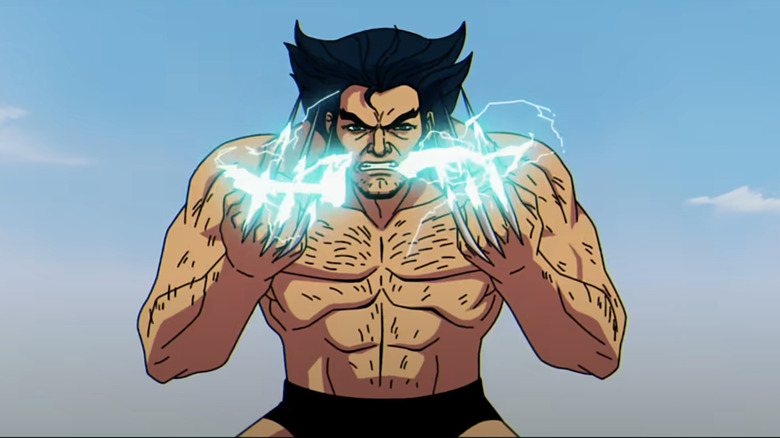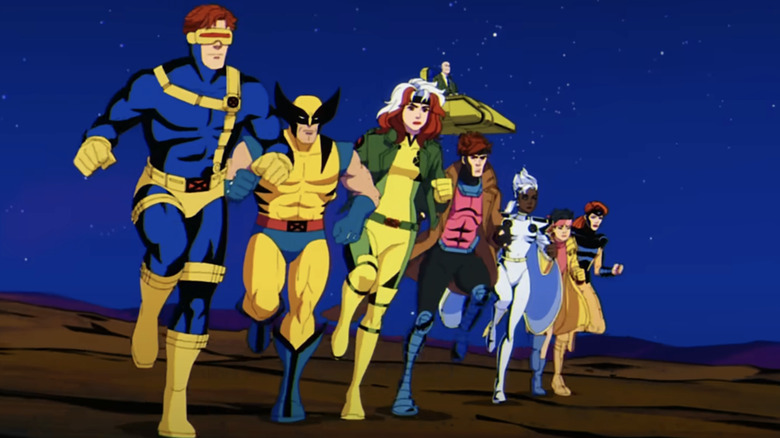Marvel’s Kevin Feige Had Two Conditions To Greenlight X-Men ’97

There was so much to love about the ’90s “X-Men” animated series that creating a revival show in 2024 seemed like a risky maneuver. But Disney’s legacy sequel series, “X-Men ’97,” debuted to great reviews, providing ’90s kids everywhere with a straight shot of animated nostalgia. Of course, the 2024 version of the show was a lot cleaner than the OG series, which originally ran from 1992 to 1997 on Fox Kids. “X-Men” debuted during a time when hand-drawn animation done under a tight budget and often shipped overseas for coloring gave all our favorite cartoons a charmingly janky aesthetic. That same feel was missing from the revival show, but that was really the only thing that felt different.
To make sure this particular nostalgia-fest hit properly, Disney and Marvel ensured they did everything they could to make “X-Men ’97” feel as close to the original series as possible. The show was presented as a direct continuation of the show, picking up after the final episode which aired on September 20, 1997. The costumes were all the same and “X-Men ’97” brought back a ton of the original “X-Men” animated series voice actors, all of which made the new show feel very much like its predecessor, even while the animation was a lot sleeker.
It seems this was of major importance to Marvel Studios head Kevin Feige, who has just hit the nostalgia jackpot once again with “Deadpool & Wolverine” — a film that made more than $1 billion at the box office by resurrecting Hugh Jackman’s Wolverine and cramming its runtime with a bewildering array of cameo appearances. With “X-Men ’97,” however, cameos weren’t quite as important as two major elements of the original series.
Kevin Feige’s two conditions for X-Men ’97
It’s no secret that Kevin Feige is, himself, a comic book fan. It’s what allowed the Marvel Studios boss to make the Marvel Cinematic Universe the most successful blockbuster franchise in cinema history. The now gargantuan saga debuted with a run of movies that were clearly made by fans who had a certain reverence for the characters being depicted. Somewhere along the way, however — specifically in the post “Avengers: Endgame” era — Marvel’s franchise found itself flailing. There are multiple reasons for this, but a big part of the problem is that there has been too much of the MCU in recent years, and Feige himself couldn’t possibly stay as involved with all the projects as he once was.
But it seems the Marvel Studios honcho retained his fanboy spirit when it came to greenlighting “X-Men ’97.” Brad Winderbaum, Marvel Studios’ head of streaming and an executive producer on the series, spoke to The Hollywood Reporter about pitching the “X-Men” revival. As Winderbaum told THR, the success of the refreshingly zany animated streaming series “What If…?” gave him an opening to pitch Feige more ideas for animated shows.
Winderbaum explained, “[‘X-Men ’97’] was my first idea out of the box. And Kevin [Feige] was like, ‘Alright, if we can get the [original] cast and we can get the song, let’s do it.’ And fortunately, we were able to do that.”
X-Men ’97 did all it could to remain faithful to the original
One of the best things about “X-Men ’97” is the fact the show assembled as many of the original voice actors as possible. Storm voice actor Alison Sealy-Smith returned for the revival, alongside Wolverine voice actor Cal Dodd, George Buza as Beast, and Lenore Zann as Rogue. While the original Cyclops voice actor, Norm Spencer, sadly passed away in 2020, his replacement, Ray Chase, did such a stellar job in the role that if you weren’t aware of Spencer’s passing, you’d swear it was him doing the voice.
The show did bring in some new additions, however, with A.J. LoCascio voicing Gambit/Remy LeBeau and original Jubilee actress Alyson Court ceding her part to Holly Chou. A handful of other new actors rounded out the cast, but overall, the producers did their best to bring back everyone they could from the original.
Meanwhile, Marvel tapped a key player to recreate the show’s titles in Larry Houston. The artist storyboarded the original opening sequence, which has become as legendary as the show itself. When you think of the animated “X-Men” series, you think of the theme song. Not only was Marvel able to use Houston’s talents, they also brought back that instantly recognizable theme for the “X-Men ’97” opening titles. While Marvel’s creative decisions have been called into question in recent years, then, there’s no doubt Feige knew what he was doing when he mandated the voice actors and theme song for the company’s revival series.
Source link






